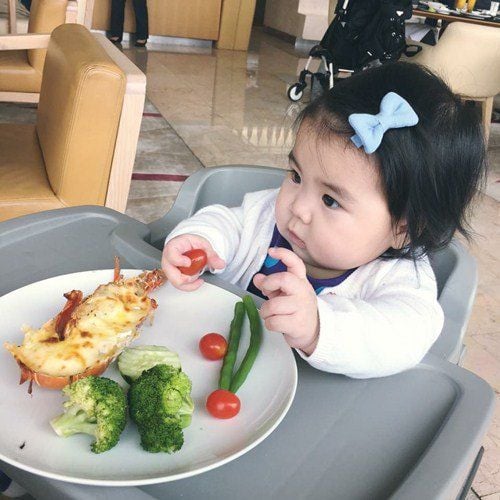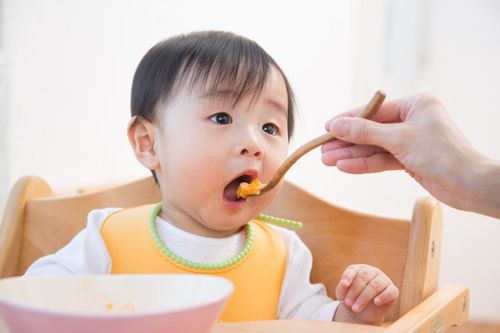This is an automatically translated article.
The article is professionally consulted by Master, Doctor Huynh Bao Toan - Department of Pediatrics - Neonatology - Vinmec Nha Trang International General Hospital.The 12-month-old milestone marks an important step in your baby's development. Many parents worry, do not know what to feed their 1-year-old children to provide enough nutrients to help them be healthier and smarter. Nutrition for a 1-year-old child needs to be balanced, diverse and suitable to become a premise for the baby's later developmental milestones.
1. 12 months old - an important milestone in your baby's development
Boy: Weighing about 9.6 - 10kg, about 70 - 75cm tall, about 6 - 8 baby teeth have grown. Children can stand on their own, learn to walk a few small steps, and can even hold and climb stairs. Psychophysiologically, the baby can recognize parents and relatives, learn to talk, know the difference between acquaintances - strangers; Girl: Weighs about 8.5 - 8.9kg, height about 70 - 74cm. Girls also have the same motor and psychophysiological development as boys of the same age. At this stage, babies are learning to walk a few small steps, practice speaking, calling parents or pronouncing simple words,...

Cột mốc 12 tháng tuổi đánh dấu bước phát triển quan trọng của bé
2. Diet for 12-month-old children
2.1 Essential nutrients for 1-year-olds What should 1-year-olds eat to catch up with growth? At the age of 1, children can already eat a variety of foods because their digestive system has worked better when they were young, adapting to many different foods. The nutritional needs of the baby are as follows:Starch: About 100 - 120g, found in rice, noodles, vermicelli, pho,...; Fat: About 25g, found in animal fat, butter, cooking oil,...; Protein: About 100 - 150g, found in fish, eggs, shrimp, crab, meat,...; Vitamins and minerals: Found in ripe fruits (about 150-200g) and green vegetables (about 50-100g). 2.2 What can 1-year-old children eat? Many parents have questioned experts about whether 1-year-old children can eat rice. According to nutritionists and pediatricians, at the age of 1 year, milk is still an important source of calcium. Therefore, milk and dairy products are food sources that need to be supplemented daily for babies with an additional amount of about 300ml - 500ml.

Khi được 1 tuổi, trẻ đã ăn được nhiều loại thực phẩm vì hệ tiêu hóa của bé đã hoạt động tốt hơn
Soft porridge, pasty rice, vermicelli, pho, noodles, ... do not grind to stimulate chewing ability for children. children's jaws and teeth; Soft foods such as shrimp, eggs, shredded chicken,...; Fruit, yoghurt and some snacks for children. 2.3 Notes on nutrition for 12-month-old children The diet is diverse, providing a full range of essential nutrients and meeting the needs of the child's body. It is recommended to mix a variety of food ingredients such as protein (meat, fish, eggs, shrimp), green vegetables (pumpkin, carrots), fat (edible oil), starch (rice, noodles), ... ; Children who are breastfed need to continue to breastfeed, those who are drinking powdered milk can switch to drinking whole milk; Encourage children to eat more green vegetables and fresh fruits; Limit the intake of fruit juices containing too much vitamin C, encourage children to drink filtered water; Should diversify dishes, beautifully presented to stimulate children to eat more appetizing; Feed children 3 main meals, 2-3 snacks/day; Should cut food for children into small pieces to avoid the risk of choking; Avoid giving your child foods that are high in salt, fat, and sugar. Then gradually transition the child's menu to a regular family meal; Children should not eat hard nuts, hard candies, ... to avoid choking; For children to sit in a dining chair, as high as the family dining table to increase communication between family members during meals; Children should not be forced to eat too much because 1 year old is the period when children are learning to eat solid foods, so let them eat happily and voluntarily; Encourage your baby to feed himself with a spoon, with his own bowl.

Cần lưu ý khi chăm sóc răng miệng cho trẻ 1 tuổi
3. Dental care for 12-month-old children
Establishing a reasonable diet is also an effective oral care measure, helping children have healthy teeth. Some important notes in dental care for 1-year-old children include:Do not let your baby drink fruit juices, milk, ... sweets before going to bed. Bacteria in the child's mouth will break down the sugar in drinks, leading to the formation of acidic plaque on the tooth surface, causing tooth decay; Children should drink milk and juice from a cup instead of a bottle to prevent tooth decay; Children need to brush their teeth right after meals and before going to bed; Children should not eat junk food often. Giving children 3 main meals and 2-3 snacks per day is enough to meet their nutritional needs; Feed children calcium-rich foods such as milk, dairy products,... to improve oral health and prevent tooth decay; Take your child to regular dental check-ups for dental check-ups and advice. Adhering to a suitable diet will help children develop comprehensively both physically, mentally and have healthy teeth.
In addition, parents should also apply some methods to change habits and improve nutrition to support the child's teeth to develop better.
Besides, parents also need to supplement their children with essential micro-minerals such as zinc, lysine, chromium, selenium, vitamin B1, ... to fully meet the nutritional needs of children. The addition of these essential vitamins also supports digestion, enhances nutrient absorption, improves anorexia, and helps children eat well. Parents can simultaneously apply dietary supplements and functional foods derived from nature for easy absorption. The most important thing is that improving your baby's symptoms often takes a long time. The combination of many types of functional foods at the same time or continuously changing many types in a short time can cause the baby's digestive system not to adapt and completely not good. Therefore, parents must be really patient with their children and regularly visit the website vimec.com to update useful baby care information.














